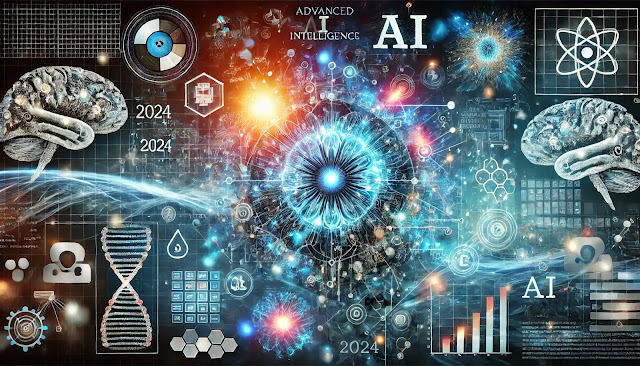Generative AI Set to Transform Industries with Quantum Computing Integration
The fusion of generative artificial intelligence (AI) with quantum computing is emerging as a transformative force across industries. This cutting-edge combination leverages the immense potential of quantum mechanics to revolutionize how we generate, process, and analyze data. With recent advancements in quantum computing from tech giants like IBM and Google, the integration of these technologies is closer to becoming a reality, unlocking unprecedented opportunities while presenting unique challenges.
The Role of Generative AI in Modern Industries
Generative AI, driven by machine learning (ML) models like GPT, DALL-E, and others, is already reshaping industries by automating creative processes, enhancing decision-making, and personalizing user experiences. Key applications include:
- Content Creation: Automating text, image, and video generation for media and marketing.
- Healthcare: Developing personalized treatment plans, drug discovery, and medical imaging enhancements.
- Manufacturing: Designing optimized production workflows and creating innovative product prototypes.
- Finance: Fraud detection, risk assessment, and automated trading.
- Entertainment: Crafting unique virtual experiences and real-time game content.
Despite these breakthroughs, traditional AI systems face computational limitations, especially when dealing with highly complex datasets or simulations. This is where quantum computing enters the equation.
Quantum Computing: A Brief Overview
Quantum computing, unlike classical computing, operates on qubits, which can exist in multiple states simultaneously (superposition). This allows quantum computers to perform parallel computations at unprecedented speeds, particularly beneficial for:
- Optimization Problems: Complex supply chain logistics or portfolio management.
- Large-Scale Simulations: Molecular modeling in drug discovery.
- Cryptography: Creating unbreakable encryption methods.
Recent Advancements in Quantum Computing
IBM's Quantum Developments:
IBM Quantum System Two: In December 2023, IBM unveiled its first modular quantum computer, the IBM Quantum System Two, which integrates multiple processors into a single system. This modularity is designed to enhance scalability and flexibility, facilitating the execution of more complex quantum algorithms.
IBM Quantum Heron Processor: In November 2024, IBM introduced the Quantum Heron processor, its most performant quantum processor to date. The Heron processor can accurately run certain classes of quantum circuits with up to 5,000 two-qubit gate operations, enabling researchers to explore how quantum computers can tackle scientific problems across various domains.
Google's Quantum Milestones:
Willow Quantum Chip: In December 2024, Google announced its latest quantum chip, Willow, capable of solving complex computational problems in mere minutes—a feat that would take classical supercomputers an unimaginably long time. This achievement underscores the potential of quantum computing to revolutionize problem-solving in various fields.
Error Correction Breakthroughs: Google has made significant progress in quantum error correction, a critical challenge in quantum computing. By improving qubit stability and reducing error rates, Google is paving the way for more reliable and scalable quantum systems, essential for practical applications.
These developments by IBM and Google highlight the rapid progress in quantum computing, bringing us closer to harnessing its full potential across various industries.
Integrating Generative AI with Quantum Computing
The integration of generative AI and quantum computing promises to revolutionize industries by enhancing AI’s capabilities to handle more complex problems. Here’s how:
1. Improved Training Efficiency:
Quantum computing can accelerate the training of generative models by parallelizing calculations and solving optimization problems more efficiently.
2. Enhanced Data Generation:
With quantum-enhanced probabilistic modeling, generative AI can create richer, more realistic datasets for simulations and predictions in healthcare, finance, and beyond.
3. Breakthroughs in Creativity:
Quantum-inspired algorithms can enhance generative AI’s ability to explore diverse design possibilities in industries like fashion, architecture, and automotive.
4. Advanced Drug Discovery:
Generative AI combined with quantum molecular modeling can accelerate the identification of novel drug candidates and predict their efficacy with higher accuracy.
5. Revolutionizing Cryptography:
Generative AI can design innovative cryptographic schemes, while quantum computing ensures their robustness against traditional and quantum cyberattacks.
Potential Benefits
- Exponential Speedups: Quantum-enhanced generative models can analyze and generate insights from massive datasets in seconds.
- Unparalleled Accuracy: Higher precision in simulations and predictions improves decision-making across sectors.
- New Market Opportunities: Accelerating innovation in unexplored domains like quantum-enhanced AI art and entertainment.
- Cost Reduction: Streamlining workflows and reducing computational resource requirements.
Challenges to Overcome
Despite the potential, integrating generative AI with quantum computing comes with its own set of challenges:
-
Hardware Limitations: Quantum computers are still in their nascent stages, with limited qubits and error rates that hinder scalability.
-
Skill Gap: Expertise in both quantum computing and generative AI is scarce, creating a barrier to adoption.
-
High Costs: Quantum hardware development and maintenance remain expensive, limiting accessibility for smaller organizations.
-
Ethical and Security Concerns: Advanced generative models powered by quantum computing could amplify biases, create hyper-realistic deepfakes, or be weaponized for cyberattacks.
-
Integration Complexity: Bridging the gap between quantum algorithms and existing AI frameworks demands significant research and innovation.
The Road Ahead
To harness the full potential of generative AI and quantum computing, collaboration across academia, industry, and governments is essential. Key focus areas include:
- Developing Scalable Quantum Hardware: Investments in robust, error-tolerant quantum processors.
- Training the Next Generation: Establishing interdisciplinary educational programs in AI and quantum computing.
- Regulating Ethical Usage: Formulating guidelines to ensure responsible development and deployment.
- Open-Source Collaboration: Encouraging knowledge sharing to accelerate breakthroughs.
Conclusion
The integration of generative AI with quantum computing is poised to redefine how industries operate, offering a glimpse into a future of unparalleled innovation. While challenges remain, recent advancements by IBM and Google demonstrate that this transformative synergy is within reach. By navigating these hurdles and fostering collaboration, we can unlock new frontiers in creativity, efficiency, and problem-solving, setting the stage for a truly quantum-powered AI revolution.





Comments